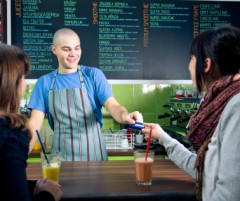The Right Way to Reward Your Customers
Guest post by John Carvalho
 In today’s fragmented marketplace, true brand loyalty seems like a hard thing for companies to acquire and harder still for companies to hang onto. Yet, it’s arguably ever more important.
In today’s fragmented marketplace, true brand loyalty seems like a hard thing for companies to acquire and harder still for companies to hang onto. Yet, it’s arguably ever more important.
Loyalty programs are a key tool for doing so. From a psychological standpoint, allowing consumers to earn and use perks lead to feelings of status, stronger brand-consumer relationships, increased word-of-mouth, and increased purchasing intentions.
But, by inviting customers to form connections with you that are emotional and not merely transactional, you open yourself to both the potential for great brand-building success but also serious failure. Customers who have emotionally invested in earning and receiving perks for each cup of coffee they drink or shirt they dry-clean can react with surprisingly strong feelings of disappointment if you let them down. See, for example, The Fatal Flaw in Loyalty Programs (And How to Minimize Damage). Research soon to be published in an upcoming edition of the Journal of Consumer Research highlights another reason why providing preferential treatment to customers can be a double-edged sword.
Earned vs Unearned Treatment
Preferential treatment can be loosely broken down in two types: earned (Starbucks Gold cards), and unearned (a free hotel upgrade as you check-in, “millionth customer” giveaways). In general, one would think consumers like receiving all preferential treatment, all the time, no matter what. Not so, says this research.
The Social Aspect
Humans are social beings. In public, we look to those around us for clues about how to feel and behave. So, in a series of inventive in-field studies, researchers set out to figure out whether social dynamics would change how people felt about earning rewards. It’s a study well worth reading in its entirety if you have time. However, the single most important takeaway for Neuromarketing readers: receiving unearned preferential treatment in the presence of others increased social discomfort and reduced customers’ satisfaction.
What does this mean?
Consumers like being rewarded, but they also care what other people think about them. As marketers, we might think the former trumps the latter, but in reality, that doesn’t always appear to be the case. In follow-up research, social discomfort kept customers from fully appreciating unearned preferential treatment even when it was awarded after they won a seemingly random “sweepstakes.”
When we surprise our consumers, let’s find ways to do it privately. McDonalds’ Monopoly pieces can be played in the store or taken home. Kiehl’s, a luxury skincare brand, infrequently has “surprise” sales- when it does, though, it provides the appropriate redemption codes through opt-in emails, removing the exchange from public. By not making the surprise reward public, we’ll be able to ensure that the only emotion they feel when they receive it is happiness.
